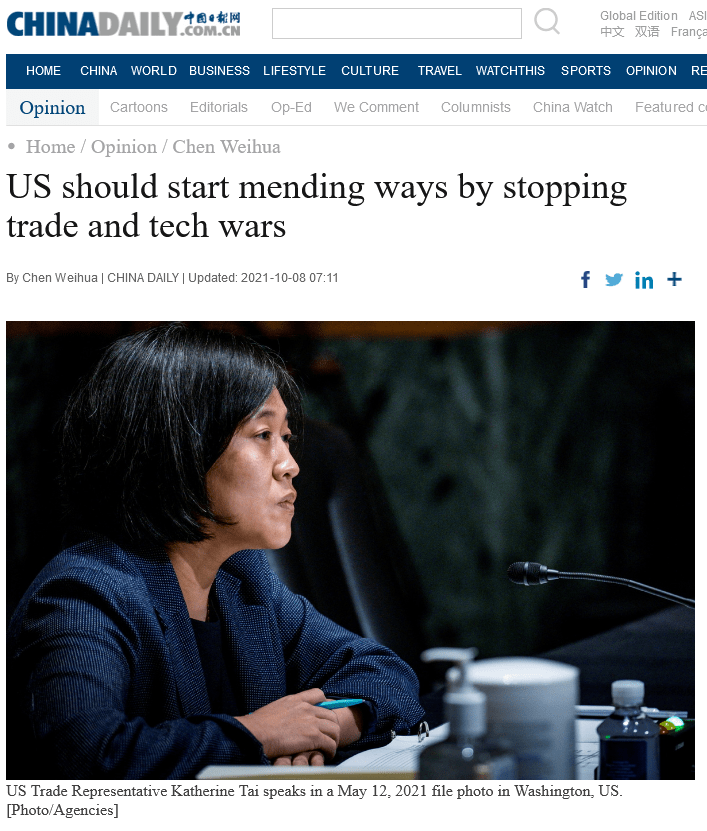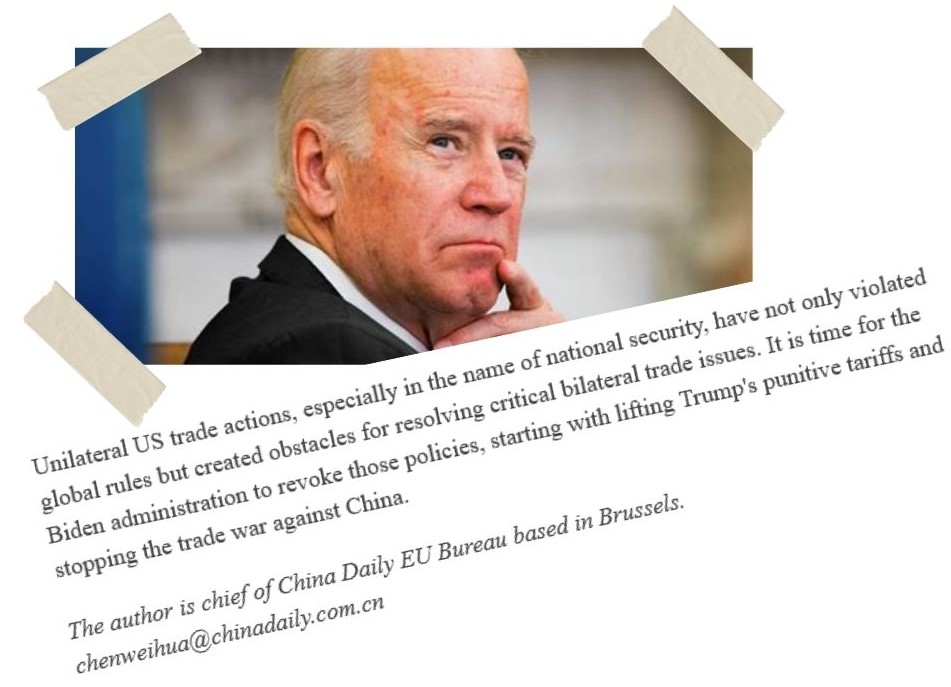On October 4 at the Center for Strategic and International Studies (CSIS) in Washington, U.S. Trade Representative Katherine Tai said the Biden administration did not want to “inflame trade relations with China.” This comes roughly three months after China hit Washington with a list of demands they required be met before the sides can mend relations. Their latest move is to hold the planet hostage. Knowing the Biden administration is gung-ho on climate change, China is saying they won’t help unless Washington dials back the angst against them.
One could make the argument that these demands are there because Beijing feels we have stepped on their toes, all ten of them. The alternative is a return to the status quo, pre-Trump. That is a total win for China, and a big L for Washington and the U.S. in nearly every measure other than wins for big multinationals and maybe Wall Street.
“Appeasing China is a failed policy position from the start,” said Michael Stumo, CEO of CPA. “China only responds to leverage. Only leverage can keep them honest or at least not as dishonest. Engagement, diplomacy and meetings have been ineffective.”
Politico compiled the demands in their China Watcher newsletter on Thursday.
The demands were announced on July 26 by Foreign Minister Wang Yi. They are part of a coordinated strategy to change the tune on tariffs and sanctions – both Xinjiang human rights-related sanctions and new capital markets sanctions imposed this year.
The China Daily addressed this very issue in an op-ed on Friday.

China is revving up the engines to counter-tariffs and sanctions.
To get some Western influencers on board, China is set to use climate change as a battering ram to break the door down on solar tariffs and to lift import bans on Hoshine Silicon Technology, a Xinjiang based company believed to be manufacturing key solar and semiconductor supply chain materials with the use of Uyghur prison labor.
China’s strategy toward the U.S., hinged to a series of uncompromising demands spelled out in “Three Bottom Lines,” a “List of U.S. Wrongdoings that Must Stop” and a “List of Key Individual Cases that China Has Concerns With,” stymies Biden’s efforts to manage bilateral friction by resolving disputes on an issue-by-issue basis, China Watcher’s host Phelim Kine wrote.
Not wanting to “inflame” China today only prolongs what China, and some in the West, see as the inevitable, with the inevitable being supply chain dominance, continued abuse of ethnic minorities in Xinjiang as part of Beijing’s war on separatists in that region, plus bringing Taiwan into the CCP’s fold. If Taiwan becomes nothing more than a defacto mainland province, CPA believes it would lead to the nationalization of both Taiwan Semiconductor and Foxconn. Both are considered indispensable in the U.S. supply chain – from cars to smartphones.
Wang Yi said that Beijing’s Xinjiang and Hong Kong policies are not “human rights” or “democracy” issues, but are about fighting against “Xinjiang independence,” and “Hong Kong independence”.
“No country will allow its national sovereignty and security to be compromised. As for the Taiwan question, it’s even more important,” he wrote.
“Although the two sides of the Taiwan Strait have not yet been reunified, the basic fact that the Chinese mainland and Taiwan belong to one and the same China and Taiwan is part of China has never changed and will never change. If Taiwan independence forces dare to provoke, China has the right to take any necessary measure to stop it.” – Wang Yi, China Foreign Minister, July 26, 2021.
China is doubling down on its all-or-nothing negotiating strategy by pegging improvements in the relationship to U.S. resolution of its grievances in the “two lists”, Kine wrote.
China is not worried about inflammatory relations and will always say the U.S. started it.
Despite Tai casting a slightly more dovish tilt this week at CSIS, it is clear what China is saying: no climate negotiations, no phase two trade negotiations, until sanctions, including capital market sanctions and the Commerce Department’s Entity List restrictions on some Chinese tech companies like Huawei, are removed.
“I noticed that some media commented that the [Huawei executive Wangzhou Meng release] removed a thorn deeply inserted in China-U.S. relations, but due to the wrong China policy the U.S. has adopted for some time, other thorns that vary in length still remain,” Chinese Foreign Ministry spokesperson Hua Chunying said on Sept. 28. “We hope the U.S. can attach high importance and take concrete actions to empty the two lists.”
What are those thorns? It’s very easy. They will tell you.

Here are some more details about those trade war tariffs top of mind in Beijing: Entity List restrictions against U.S. companies like Intel selling to Huawei, others; bans on some Xinjiang supply chains, including those integrated into the global solar industry, an industry dominated almost completely by China; tariffs and sanctions of all kinds must be removed. These are the thorns China wants to be plucked from its skin before they signal to Washington that all is well, and they can be friends again.
Politico’s China Watcher got it right. Agreeing to China’s demands are “a political and ideological non-starter for the Biden administration,” Kine wrote.
Beijing is not worried about inflaming. Washington shouldn’t either.
Why Washington Shouldn’t be Worried About ‘Inflaming’ China Relations
On October 4 at the Center for Strategic and International Studies (CSIS) in Washington, U.S. Trade Representative Katherine Tai said the Biden administration did not want to “inflame trade relations with China.” This comes roughly three months after China hit Washington with a list of demands they required be met before the sides can mend relations. Their latest move is to hold the planet hostage. Knowing the Biden administration is gung-ho on climate change, China is saying they won’t help unless Washington dials back the angst against them.
One could make the argument that these demands are there because Beijing feels we have stepped on their toes, all ten of them. The alternative is a return to the status quo, pre-Trump. That is a total win for China, and a big L for Washington and the U.S. in nearly every measure other than wins for big multinationals and maybe Wall Street.
“Appeasing China is a failed policy position from the start,” said Michael Stumo, CEO of CPA. “China only responds to leverage. Only leverage can keep them honest or at least not as dishonest. Engagement, diplomacy and meetings have been ineffective.”
Politico compiled the demands in their China Watcher newsletter on Thursday.
The demands were announced on July 26 by Foreign Minister Wang Yi. They are part of a coordinated strategy to change the tune on tariffs and sanctions – both Xinjiang human rights-related sanctions and new capital markets sanctions imposed this year.
The China Daily addressed this very issue in an op-ed on Friday.
China is revving up the engines to counter-tariffs and sanctions.
To get some Western influencers on board, China is set to use climate change as a battering ram to break the door down on solar tariffs and to lift import bans on Hoshine Silicon Technology, a Xinjiang based company believed to be manufacturing key solar and semiconductor supply chain materials with the use of Uyghur prison labor.
China’s strategy toward the U.S., hinged to a series of uncompromising demands spelled out in “Three Bottom Lines,” a “List of U.S. Wrongdoings that Must Stop” and a “List of Key Individual Cases that China Has Concerns With,” stymies Biden’s efforts to manage bilateral friction by resolving disputes on an issue-by-issue basis, China Watcher’s host Phelim Kine wrote.
Not wanting to “inflame” China today only prolongs what China, and some in the West, see as the inevitable, with the inevitable being supply chain dominance, continued abuse of ethnic minorities in Xinjiang as part of Beijing’s war on separatists in that region, plus bringing Taiwan into the CCP’s fold. If Taiwan becomes nothing more than a defacto mainland province, CPA believes it would lead to the nationalization of both Taiwan Semiconductor and Foxconn. Both are considered indispensable in the U.S. supply chain – from cars to smartphones.
Wang Yi said that Beijing’s Xinjiang and Hong Kong policies are not “human rights” or “democracy” issues, but are about fighting against “Xinjiang independence,” and “Hong Kong independence”.
“No country will allow its national sovereignty and security to be compromised. As for the Taiwan question, it’s even more important,” he wrote.
China is doubling down on its all-or-nothing negotiating strategy by pegging improvements in the relationship to U.S. resolution of its grievances in the “two lists”, Kine wrote.
China is not worried about inflammatory relations and will always say the U.S. started it.
Despite Tai casting a slightly more dovish tilt this week at CSIS, it is clear what China is saying: no climate negotiations, no phase two trade negotiations, until sanctions, including capital market sanctions and the Commerce Department’s Entity List restrictions on some Chinese tech companies like Huawei, are removed.
“I noticed that some media commented that the [Huawei executive Wangzhou Meng release] removed a thorn deeply inserted in China-U.S. relations, but due to the wrong China policy the U.S. has adopted for some time, other thorns that vary in length still remain,” Chinese Foreign Ministry spokesperson Hua Chunying said on Sept. 28. “We hope the U.S. can attach high importance and take concrete actions to empty the two lists.”
What are those thorns? It’s very easy. They will tell you.
Here are some more details about those trade war tariffs top of mind in Beijing: Entity List restrictions against U.S. companies like Intel selling to Huawei, others; bans on some Xinjiang supply chains, including those integrated into the global solar industry, an industry dominated almost completely by China; tariffs and sanctions of all kinds must be removed. These are the thorns China wants to be plucked from its skin before they signal to Washington that all is well, and they can be friends again.
Politico’s China Watcher got it right. Agreeing to China’s demands are “a political and ideological non-starter for the Biden administration,” Kine wrote.
Beijing is not worried about inflaming. Washington shouldn’t either.
MADE IN AMERICA.
CPA is the leading national, bipartisan organization exclusively representing domestic producers and workers across many industries and sectors of the U.S. economy.
TRENDING
CPA: Liberty Steel Closures Highlight Urgent Need to Address Mexico’s Violations and Steel Import Surge
CPA Applauds Chairman Jason Smith’s Reappointment to Lead House Ways and Means Committee
Senator Blackburn and Ossoff’s De Minimis Bill is Seriously Flawed
JQI Dips Due to Declining Wages in Several Sectors as November Jobs Total Bounces Back from Low October Level
What Are Trump’s Plans For Solar in the Inflation Reduction Act?
The latest CPA news and updates, delivered every Friday.
WATCH: WE ARE CPA
Get the latest in CPA news, industry analysis, opinion, and updates from Team CPA.
CHECK OUT THE NEWSROOM ➔